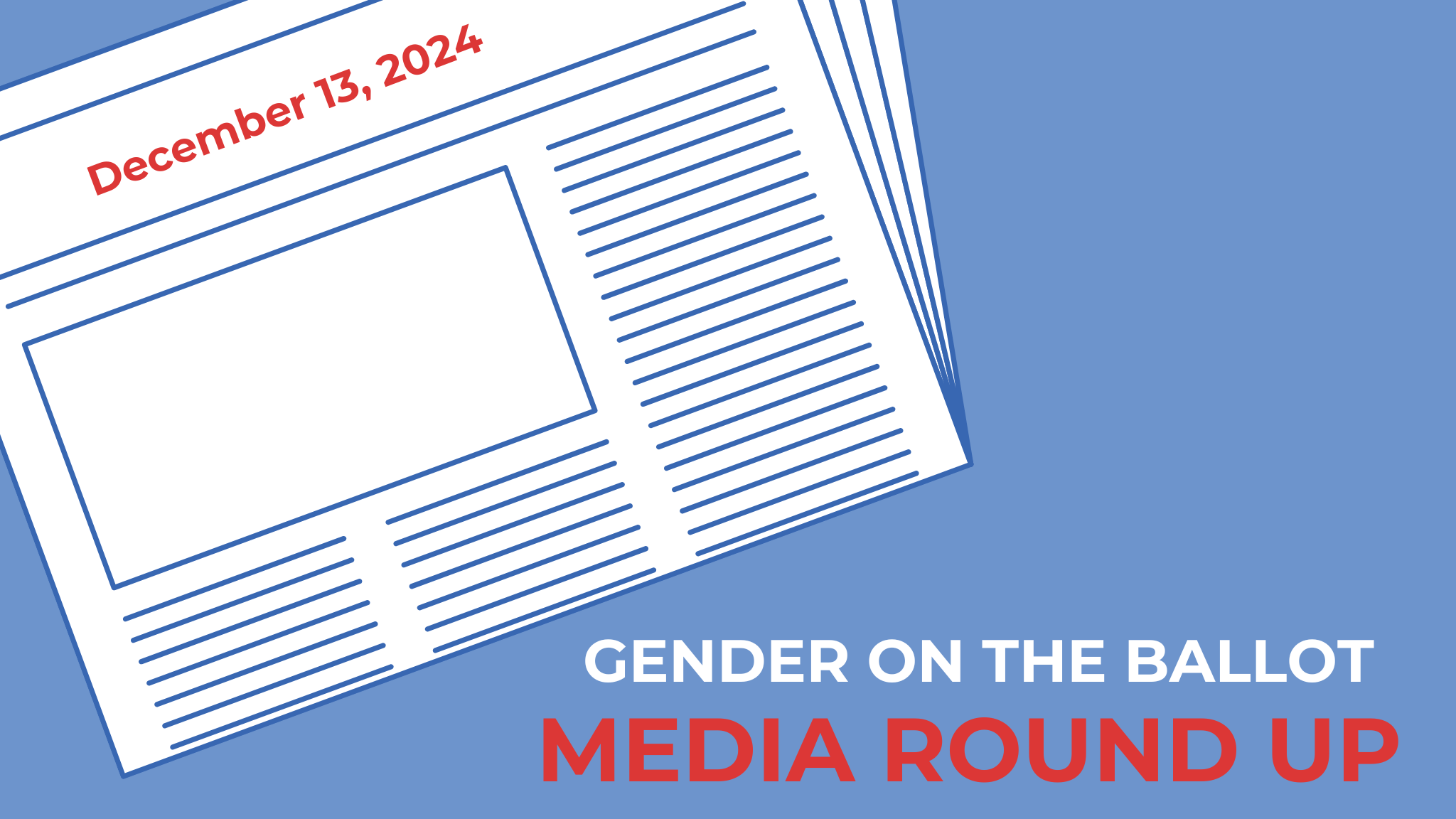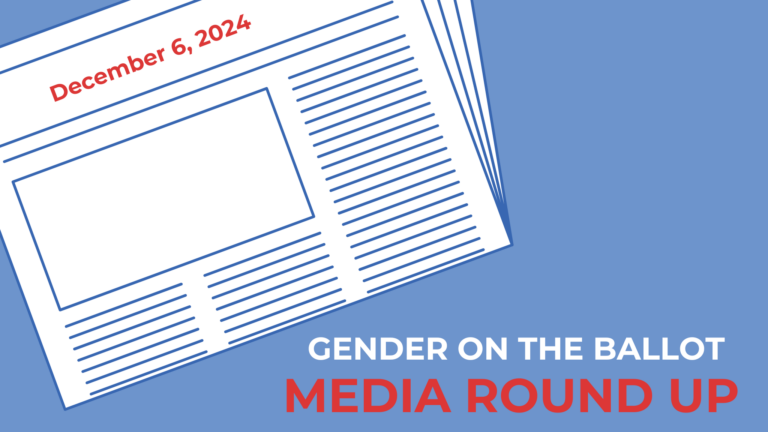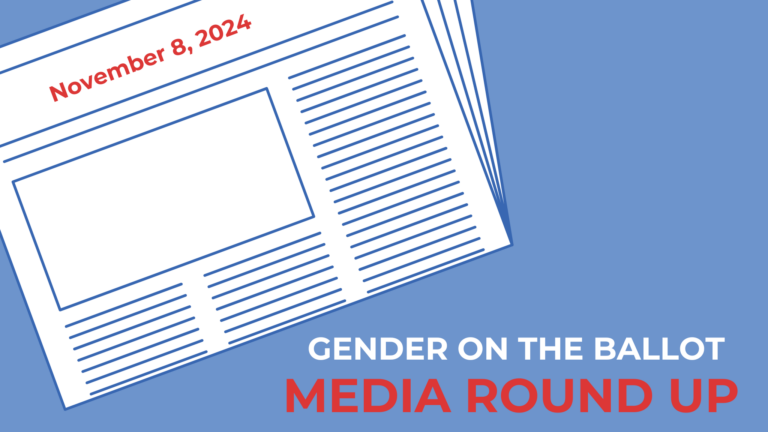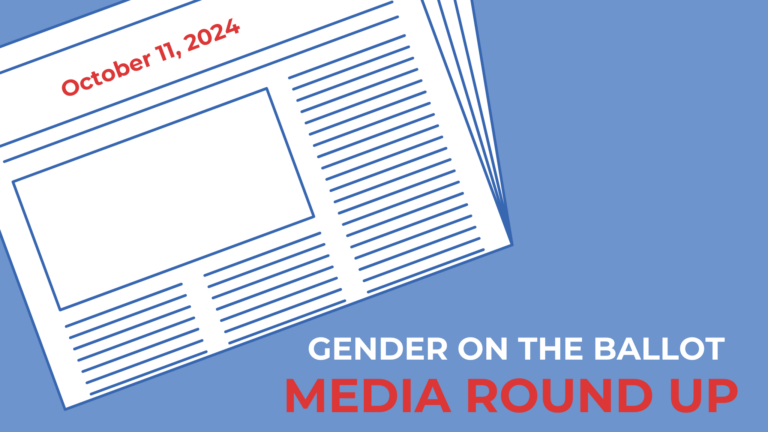Welcome to our Media Round Up. Each week we’re collecting and sharing our favorite gender…
Weekly Media Round Up: December 13, 2024

Welcome to our Media Round Up. Each week we’re collecting and sharing our favorite gender + politics stories. The holidays have not slowed down the news, so settle in and get caught up.
Hitting a paywall? Some sources allow a few free articles without a subscription, and your university or local library may offer free access. For example, AU students, faculty, and staff have access to popular newspapers through the library. Click here to learn more.
Who Is Alina Habba, the Lawyer Trump Picked to Serve as Counselor to the President?
The New York Times, Noah Weiland
President-elect Donald Trump has picked another woman to serve in his administration, Alina Habba. Habba is a lawyer who has worked extensively with Trump since his leaving office in 2021, and is founder of the Habba Madaio & Associates firm. She’s worked on various lawsuits against Trump, including the New York civil fraud trial and one against The New York Times for improper tax record disclosure. She will be counselor to the president during Trump’s second term, a position previously filled by Kellyanne Conway. Trump has lauded her accomplishments as a first-generation American after her parents fled Iraq, calling her a “‘role model for women in law and politics.’”
Biden Appoints 40 Black Women as Federal Judges, Breaking Record
Capital B News, Christina Carrega
As President Biden’s term is coming to a close, he has made a historic move by appointing 40 Black women to be federal judges. In total, he has appointed 62 Black judges, blowing past President Carter’s number of 37 Black judges. Former President Barack Obama appointed 26 Black women during his administration, while Trump appointed just two. This achievement comes in the face of Trump’s incoming administration, one that many feel threatens civil rights protections and issues important to the Black community, like health care, voting rights, and education equity. With lifetime appointments, these appointees are free from political pressure. Delores Jones-Brown, a professor emeritus at the John Jay College of Criminal Justice in New York, describes the importance of the addition of many Black women to the courts, “I think many of the Black women will understand that their role is to provide justice in places where it has not been.”
International Women’s Forum Announces New Board Officers and Directors
The International Women’s Forum (IWF), the global organization of over 8,000 top women leaders in 34 countries, announced its election of new global board officers and directors this week in Hong Kong. WPI ED Betsy Fischer Martin has been named as one of six new board directors, who will work to further IWF’s mission of advancing women’s leadership. The IWF is an international community to advance women’s leadership throughout the world,” Fischer Martin said, “I’m honored to be part of this work on behalf of women everywhere.”
The World’s Most Powerful Women
The annual Forbes Power Women list is out! It is determined by four main metrics: money, media, impact and spheres of influence. The result: 100 women across finance, technology, media and beyond who command a collective $33 trillion in economic power and influence more than 1 billion people. The Top 4 all come from the Politics/Policy category, and a total of 18 of 100 list are political/policy leaders, including Susie Wiles, President-Elect Trump’s designee for Chief of Staff.
Women and AI: The Good, The Bad, and The Ugly
Artificial Intelligence (AI) has been the subject of animated discussion in recent years, as advancements in its usage have yielded both desirable and undesirable outcomes. According to a new study from think tank American Sunlight Project, more than two dozen members of Congress have been the victims of sexually explicit AI deepfakes – perhaps unsurprisingly, an overwhelming majority of those impacted are women. Findings from the study identified over 35,000 mentions of “nonconsensual intimate imagery (NCII)” on deepfake websites. Though most of the imagery was quickly removed as researchers shared their findings with impacted members of Congress, there is currently limited policy to restrict the creation and spread of NCII. In better AI news this week, philanthropist Melinda French Gates announced that she is donating $150 million to a number of nonprofits to help remove barriers for women in the workplace; nearly a third of the money will go toward advancing women in AI and the tech industry. Some of the funds will go to Break Through Tech AI, which helps women outside of top schools obtain the training and support they need to land work in the tech industry. Her donation comes at a time when women constitute only 22 percent of AI workers globally – a “worrying” figure, given how “fast-growing the sector is.”
Women in the Workplace
While there is no question that women have made major gains in the political arena in recent years, there has been “limited progress” in gaining leadership positions in business. A task force of female business leaders, entrepreneurs, and activists convened by The New York Times concluded that a lack of corporate and government policies to support women as they balance work life and house demands is, in part, responsible for this discrepancy. The panel agreed that policies providing for greater paternity leave, more diversity in the workplace, better child care options, and a more flexible work environment would enable women to thrive in the corporate world. When women do advance in the workplace, however, they are often inadequately compensated for their work: research suggests that women may be at greater risk of being offered “dry promotions” – where an employee takes on new responsibilities or receives a title upgrade without a pay increase. According to studies from the Women in the Workplace report by McKinsey and LeanIn.org, women are more likely to take on “office housework” without receiving recognition or compensation. Women may be asked to take on office housework due to stereotypes that women are organized multitaskers, but another stereotype – that women are too emotional to lead – has recently been debunked in a study reported by Harvard Business Review. The research found that women were less likely than men to let their emotions impact their leadership negatively: while anxious male leaders were more prone to hostile behaviors, women prioritized compassionate, family-supportive actions.
Closing the Gender Gap in Healthcare and Giving
President Biden and First Lady Jill Biden hosted a new conference on Wednesday, one focused on women’s health and closing the gender disparity. The White House Conference on Women’s Health Research, primarily led by Jill Biden, addressed the gendered issue in healthcare and the lack of thorough research done on women’s health issues. The First Lady said they’ve spent $1 billion on research for diseases and ailments that affect women differently than men, like arthritis, menopause, and heart disease. Various agencies are using their funding for research, including the Pentagon, National Institutes of Health, and the Defense Department. However, there are still massive gender gaps in care and support. The Women’s Philanthropy Institute found that only 1.8% of all charitable giving in the U.S. goes towards women’s organizations. This leads to especially dire consequences for organizations that support domestic violence victims as they have no funding or resources for survivors. When there is no support for women, the cycle of violence continues and gets worse. Looking forward, individuals and corporations should focus more of their donations to women’s causes.






